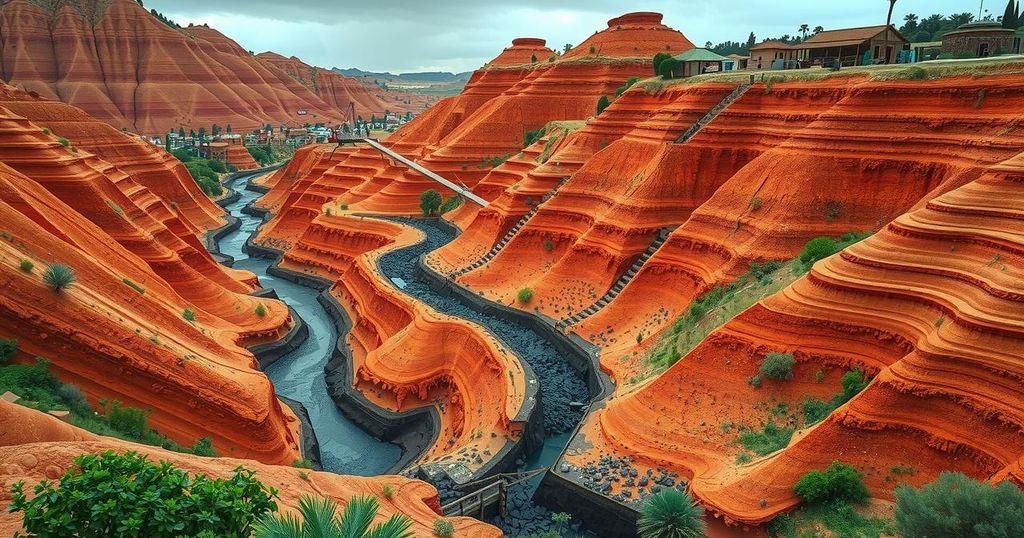Cobalt’s Potential in Morocco Grows with Amassine Project

- Morocco’s cobalt narrative is shifting with the Amassine Project.
- Catalyst Mines Inc. reports a possible USD $60 billion in mineralized rock.
- The Amassine Project could significantly increase Morocco’s cobalt production.
- A cobalt-sulphate refinery is in the works to support battery production.
- Free-trade agreements position Morocco as a strategic mineral supplier.
Morocco’s Cobalt Potential Shows Promise Amidst Global Demand
Cobalt is increasingly viewed as a critical commodity, especially as demand for electric vehicles continues to rise. With every ton of cobalt that can circumvent the costly bottlenecks associated with the Democratic Republic of Congo—often seen as the world’s cobalt epicenter—the dynamics of battery production worldwide are transformed. Morocco, often overlooked in discussions of cobalt resources, appears to be stepping into the spotlight. Executives from Catalyst Mines Inc. are optimistic about the cobalt reserves in Morocco, especially given recent exploratory successes around the Berber hamlet of Amassine, where an estimated USD $60 billion in mineralized rock could redefine the country’s role in global supply chains—a development that could greatly benefit both North American and European automakers looking to diversify their sources of raw materials and fulfill ESG requirements.
Catalyst Mines Uncovers Promise for Cobalt Extraction
The Amassine Project is situated just 90 kilometers southwest of Morocco’s Bou Azzer, which has long been the focus of cobalt extraction in the region. Historically, Bou Azzer boasts high purity cobalt but lacks the scalability to compete with its Congolese counterpart. However, reports from Catalyst Mines indicate that Amassine’s exploration results suggest the potential for an open-pit mining operation that can yield a longer lifespan and an enhanced capacity for extracting valuable minerals. The recent sampling at Amassine has revealed promising averages: including over 10,000 ppm chromium and substantial amounts of nickel and cobalt, with expectations for higher grades at greater depths.
Infrastructure Development and Market Positioning Further Enhance Prospects
Morocco’s strategy extends beyond just cobalt extraction; the establishment of a cobalt-sulphate refinery near Marrakech is part of a larger initiative that signals a new direction for the nation’s mining sector. Set to produce battery-grade cobalt by 2025, this refinery underlines Morocco’s commitment to enhancing its mining infrastructure, providing a much-needed outlet for the increasing production expected from Amassine. Additionally, the country’s free-trade agreements with both the EU and the United States further position Morocco as a viable alternative for critical mineral supply chains, especially against the backdrop of growing Chinese investments in the Moroccan battery mineral ecosystem. This infusion of capital not only underscores the strategic importance of Moroccan cobalt but may also prompt Western firms to secure dependable sources of metals that are tantamount to battery production.
A Potential Shift in the Cobalt Market Dynamics
In conclusion, Morocco is poised on the brink of a remarkable shift in its cobalt mining landscape. Should Catalyst Mines successfully extract cobalt as anticipated, Morocco could ascend to a prominent position in the global cobalt market, forging a unique identity in light of increasing environmental, social, and governance (ESG) compliance on the world stage. The stakes are high, and so are the opportunities—both for Morocco as an emerging player in cobalt, as well as for international automotive manufacturers seeking to future-proof their supply chains.
The burgeoning cobalt potential in Morocco, particularly through the Amassine Project, could reposition the nation from its current status to among the world’s top cobalt producers. This comes at a critical time when shifts in market dynamics and demand for ethical sourcing are becoming paramount for manufacturers. With infrastructure developments and cross-border agreements in play, Morocco stands ready to redefine its role in the ever-evolving global cobalt landscape.




